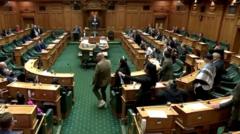In New Zealand's parliament, a powerful display of cultural defiance unfolded as MPs performed a haka in response to a contentious bill proposing to reinterpret the Treaty of Waitangi, the cornerstone of Māori rights. The act, led by opposition party MP Hana-Rawhiti Maipi-Clarke, interrupted the parliamentary proceedings amidst escalating tensions surrounding the legislation.
As MPs engaged in the symbolic ceremonial dance, thousands of people participated in a peaceful protest march termed hīkoi, organized by a Māori rights group, preceding their arrival in Wellington. This 10-day march, which began in the northern regions of New Zealand and saw significant participation across multiple cities, aims to voice discontent regarding the bill that further unsettles the already fraught discussions about Māori rights.
The proposed legislation, introduced by the minor Act Party, aims to create a legal definition for the principles of the 1840 Treaty of Waitangi. Proponents argue that clarity is desperately needed to enhance the legislative interpretation of the treaty that has long shaped race relations in New Zealand. Act's leader, David Seymour, insisted that current interpretations have led to societal divisions and that parliaments should assume authority over such definitions rather than the courts.
However, critics warn that the bill could lead to greater fragmentation of national unity and undermine much-needed support for Māori communities. Following a brief suspension of parliamentary activities, the bill's initial reading passed with coalition support, although its future remains uncertain as indications suggest lack of backing from other coalition partners.
As the marches gained momentum, participants expressed deep concern over the potential ramifications of the legislation. Danielle Moreau, a Māori participant, articulated her sentiments, expressing hope that the hīkoi would serve as a testament to the treaty’s significance in shaping New Zealand's identity. Other marchers highlighted the vital role of the treaty in fostering a multi-cultural society rooted in bicultural principles, a sentiment echoed by various Māori community leaders.
The proposed law outlines principles such as the government’s right to govern and the necessity of respecting Māori rights, all framed against a backdrop of perceived inequities that persist among Māori populations. Prime Minister Christopher Luxon described the bill as "divisive," indicating political fractures within the coalition itself.
Legal experts and agencies like the Waitangi Tribunal have expressed significant reservations regarding the bill's implications, noting that it intentionally excluded Māori consultation processes, undermining partnership principles established in the Treaty of Waitangi.
With New Zealand's Māori population facing considerable disparities across health, education, and social markers, the debate surrounding the Treaty of Waitangi remains a pivotal national concern. The bill is set to undergo a six-month public hearing process through a select committee, but its controversial standing continues to reverberate within communities committed to preserving Māori rights and identity.


















